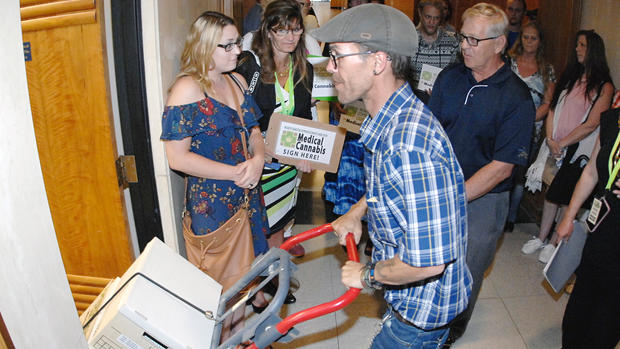Ballot Measures Should Have to Be Introduced in the Legislature First

Brandon Muhs, front, of Fargo, North Dakota, pushes a dolly cart with boxes containing petition signatures into the Secretary of State's office on 7-11-2016 for a medical marijuana initiative for consideration on the November ballot. Initiative committee chairman Rilie Ray Morgan, second from right, and his wife, Rita, far right, also of Fargo, were among a group of supporters gathering at the state Capitol in Bismarck, North Dakota.
Legislating at the ballot box is a terrible way to make public policy.
On election day we already ask voters to make informed choices on a myriad of candidates from the federal races down to hyper local races for court and soil conservation officials. Is it fair to also ask them to vote on complicated policy proposals, sometimes made up of dozens of pages of legal language, which has received no vetting at all from our state’s legislative process?
That’s how we get stuck passing a medical marijuana ballot measure that doesn’t actually decriminalize medical marijuana.
Still, this iteration of direct democracy has its defenders. Often people who simultaneously deride how vulnerable our policies are to influence from deep-pocketed interests, which is ironic given that the initiated measure process was basically designed to let special interest groups short circuit the legislative process. If you have enough money to hire some some signature collectors, and fund a slick marketing campaign, chances are good you can get your pet issue made law.
Just ask California billionaire Henry Nicholas, the exclusive funder of the Marsy’s Law campaign in the 2016 cycle.
Because of all this state lawmakers have convened an interim panel to review the initiated measure process for possible changes. One proposal, from Minot state Rep. Scott Louser, would amend the state constitution to require that any proposed measure getting the qualifying number of signatures be forwarded to the Legislature first for a vote:
One proposed constitutional amendment would require initiated measures that have attracted enough signatures to be submitted to the Legislature for a vote. If lawmakers or the governor reject the measure, it would be placed on the next general election ballot, according to a draft of the resolution shared with Forum News Service.
Minot Republican Rep. Scott Louser, a member of the Initiated and Referred Measures Study Commission, said that’s meant in part to provide access to Legislative Council staffers experienced in drafting legislation. Moreover, it would save measure backers time and money if the Legislature approved it, he said.
I’m sure crtics of this proposal would point out that it significantly draws out the timeline for getting a measure approved. Legislative sessions are held in odd-numbered years, starting in January after the November elections. Petitioners would have to collect their signatures during election year, wait to see how the Legislature acts on their measure during the regular session the next year, and then if lawmakers reject it campaign for that issue the following election year.
I’m not opposed to that – making public policy should be an arduous process by definition – but I don’t expect it to be popular.
So let me offer a different proposal. Allow voters to refer legislation defeated during the session to the ballot for enactment in much the same way they can currently refer passed legislation to be rejected. If lawmakers aren’t acting on the will of the people, the people would have the opportunity to pass the proposals themselves.
The requirements for referring a defeated bill could mirror those for one that was enacted.
I’d stop there. I see little need for the petition process. Still, for the sake of compromise, perhaps we could couple those changes with a doubling of the current signature requirements to put a proposed measure on the ballot – currently over 13,000 for statutory measures and nearly 27,000 for constitutional amendments.
Those combined reforms are rigorous enough to ensure good policy making but not unduly prohibitive for initiated measure activism.




